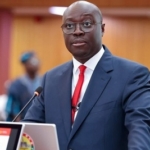
Ghana’s projected economic path for 2026, as outlined in the government’s Budget Statement and Economic Policy, has been met with caution by the Institute for Statistical, Social and Economic Research (ISSER).
During its post-budget review, the institute warned that deep-seated structural weaknesses and a concerning decline in capital expenditure (CAPEX) could undermine the anticipated fiscal consolidation and long-term competitiveness, despite headline tax reforms.
Growth Targets Questioned Amid Structural Decline
ISSER expressed scepticism over the government’s projected Gross Domestic Product (GDP) growth rate of 4.8% for 2026.
The institute characterised the figure as “a bit low”, especially when considering the stronger economic performance recorded in the first two quarters of the preceding year.
The Institute cautioned that this conservative forecast “raises questions about underlying economic drivers and the future strength of the recovery.”
A significant source of this concern is the severe contraction in the construction subsector, coupled with a continuous decline in government capital spending.
- Low Capital Expenditure (CAPEX): ISSER highlighted that Ghana’s CAPEX levels currently stand at a meager 1.7% of GDP. This figure is alarmingly low compared to other countries in the sub-region, which often record CAPEX levels exceeding 10% of GDP.
- Threat to Competitiveness: According to the Institute, this sharp deceleration in public investment “poses a significant threat to business efficiency and long-term competitiveness” if not addressed urgently.
Fiscal Consolidation Risks and Lack of ‘Big Push’ Detail
While acknowledging that the government has made positive strides in fiscal consolidation, primarily through reductions in interest payments and capital spending, ISSER warned that this approach is potentially problematic.
The focus on cuts, rather than strategic investment prioritisation, may not be sustainable.
The Institute stressed that although the revised Fiscal Council is a step in the right direction, the government must make “prioritisation of spending… central to maintaining macro stability.”
Furthermore, ISSER lamented that the government’s heavily advertised development initiative, the “big push,” which is focused on major infrastructure projects like the Accra-Kumasi Expressway , “does not find real expression in the budget.”
This suggests that the transformative funding needed to drive such an ambitious programme may not be adequately reflected in the current financial plan.
Mixed Review on Tax Reform and Value Chains
ISSER provided a mixed assessment of the budget’s sectoral policies:
- Positive Tax Reform: The Institute welcomed the reduction in effective tax rates resulting from Value Added Tax (VAT) reforms, calling it a “very positive” move. This change is expected to boost compliance and ease the financial burden on the business community.
- Agriculture Fragility: While acknowledging recent improvements in agricultural production, ISSER stressed that these gains remain fragile. Long-term success is dependent on fixing structural bottlenecks throughout the agricultural value chain, from farm to market.
- Exchange Rate and Investor Confidence: Although exchange rate stability is showing signs of improvement, ISSER insisted that this stability “must be sustained” to fully restore investor confidence in the Ghanaian market.
Call for Dialogue on Education and R&D
Finally, ISSER raised concerns about new levies and long-term sustainability plans:
- Airport Development Levy: The Institute questioned the rationale behind the newly proposed airport development levy, calling for a thorough cost–benefit analysis to ensure its implementation is consistent with Ghana’s national tourism development plan.
- Education Subsidies: ISSER called for an immediate national dialogue on education subsidies, stressing that limited fiscal space continues to strain the finances of both the government and public universities.
- Future Resilience: The report concluded with a strong call for long-term strategic investment, urging Ghana to invest significantly more in research and development (R&D), particularly within the renewable energy sector, to meet future energy mix targets and strengthen the nation’s overall economic resilience.